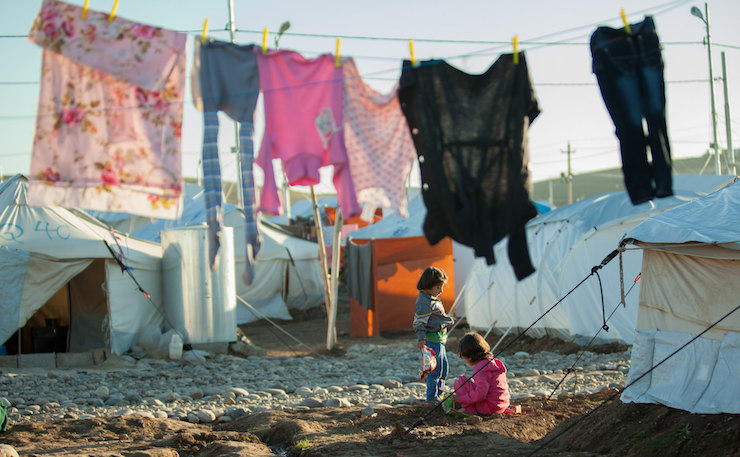As Europe contemplates taking a path forged by Australia, the lives of those who flee conflict now and in the future hang in the balance, writes Paul McPhun.
This week Europe celebrated unity and peace on Europe Day. But in 2016 we fear its leaders, like Australia’s Prime Minister Malcolm Turnbull and Opposition Leader Bill Shorten, are united in turning their backs on those seeking our protection.
In March, Europe’s leaders passed a deal with Turkey that allows Greece to send people back to Turkey in exchange for, among other things, a multi-billion Euro financial aid package. Sound familiar?
Just like Australia’s “push back” policy and offshore detention program this new agreement, the so-called “EU-Turkey Deal”, threatens the right of all people to seek asylum and violates governments obligations to assist each man, woman or child asking for protection. Putting people’s lives or health at risk and causing suffering in asylum seekers is not a justifiable way to stop others risking their lives at sea, or worse, to control borders.
Pushing people back to their country of last transit or banishing them to offshore detention transforms asylum into nothing but a political bargaining chip to keep refugees as far away from our borders and the eyes of the voting public as possible.
In exchange for this deal, Europe promises “humanitarian” and development aid to fulfill the needs of Syrian refugees and presents these funds as a measure to ease human suffering. But this aid to willing neighbours such as Turkey (just like the aid given to Papua New Guinea and Nauru), is conditional on shipping suffering offshore. It betrays the humanitarian principle of providing impartial aid based on need, and need alone, without political strings attached. By offering billions of euros to care for people out of sight in Turkey, Europe is also asking aid agencies to become complicit in their border control scheme.
The Australian government has also referred to its push back policy as ‘humanitarian’. It has similarly funded it at the cost of its overseas development aid budget. But there is nothing whatsoever humanitarian about denying people their right to seek protection, and instead leaving people to suffer or die out of sight.
This deal in Europe is the most organised and collective attempt yet to push people back rather than take them in. With this Europe, just like Australia, sends a dangerous signal to the rest of the world: you can buy your way out of providing temporary protection and asylum. If replicated by other nations, the concept of refugee will cease to exist. People will be trapped in war zones unable to flee for their lives, under constant threat from warring parties, even bombed in displaced camps congregated along closed borders – as we have recently witnessed in Syria.
Not only does this have a dramatic effect on those seeking protection through the refugee system of today, but it significantly undermines the credibility of the refugee convention. When signatories like Australia and European nations systematically flout these norms how can we expect to convince our Asian neighbours to adopt the same international responsibilities.
The EU and Australia go to great lengths to explain how such deals respect international and European law. We’re not convinced. Similar assurances in the past have failed to materialise and our teams providing aid on the ground witness abuses on European soil, including brutal interceptions of boats by Turkish authorities in the Aegean Sea, the suffering of stateless refugees and displaced across Southeast Asia, putting the lives of vulnerable people ever more at risk. More recently we’ve reset bones broken by European police, treated children shot in the head by their rubber bullets and rinsed the eyes of babies doused in tear gas.
Meanwhile the welcome offered to those in Greece echoes Australia’s welcome, often erasing what little hope people had left. In the Mediterranean island ‘hotspots’ there are virtually no safeguards in place. Women fear to go to the toilet once darkness falls, mothers beg for milk to feed their babies, and men of all ages lose their dignity fighting over scraps of food or who is next in line.
We understand that meeting the huge challenges of the global displacement crisis has become a controversial political issue but for us it is first and foremost a humanitarian one. Quite simply, people need our help and protection.
While many people around the world have risen to this challenge by volunteering to help others, world leadership has lagged behind for fear of political consequences.
We ask that leaders of Europe, Australia and the rest of the world, rise to the challenge: stop pushing suffering off-shore, stop trying to buy your way out of your responsibilities, don’t instrumentalise aid as a tactic for border control, and instead use your substantial resources to protect those who need your help.
Donate To New Matilda
New Matilda is a small, independent media outlet. We survive through reader contributions, and never losing a lawsuit. If you got something from this article, giving something back helps us to continue speaking truth to power. Every little bit counts.





